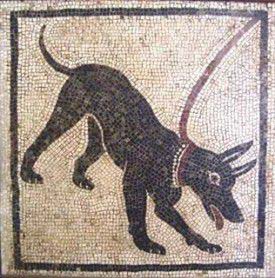A Jungian Psychotherapist & Suburban Life, 5: Dogs

A Jungian case studies has a passionate interest in symbols, and one of the most strikingly visible symbols in suburban life must surely be: dogs.

“CAVE CANEM” – “Beware the Dog”, Pompeii, Italy 1st C., A.D.
“Yes, Brian”, you say, “I get it. There are dogs in suburbia. OK. Big deal. So what?”
[hs_form id=”17″]
Suburbia as Doggy Homeland
Dogs are almost omnipresent in suburbia. Clearly, in our culture as a whole, and in suburbia in particular, dogs are very important to very many people. To a Jungian case studies, this importance is both psychological and symbollic. The recent CBC documentary Dog Dazed opens up this more psychological aspect of dog ownership powerfully.
In suburbia, what is the psychological function of the dog?
Well, there are several important things to note about our dogs…

Dogs Don’t Desert
Dogs are by nature social, and instinctively adapted to life in packs. This social aspect of dogs likely made them the first animal to ever be domesticated.
One of the things that endears us to dogs is that they are particularly responsive to human affection and care. These are beings both very different from ourselves, and very open and eager to be emotionally connected to us.
Dogs don’t desert their masters. As a result in myth, and many religious traditions they are portrayed as accompanying their masters to death and into the afterlife. This symbolism was common in ancient Egypt, as Manchester Museum Egyptologist Campbell Price tells us.
As a result of these attributes, dogs have a very deep, even archetypal place in the human psyche.
Dogs as Instinct
Another aspect of dogs is revealed in the way that they represent the body and instinct in life.
Humans have long relied on the dog’s superior senses — superior hearing, ability to detect scents, sureness of direction — to extend the range of our own senses. We are acutely aware that, in certain of these respects the dog’s abilities are unquestionably superior to our own.
Dogs in human life may also be symbolic of instinct. Given their nature, they unquestionably represent an instinctual desire to be social, to affiliate, to “be part of”. Similarly, they can represent the sexual instinct for humans; the territorial or boundary-maintaining instinct, and the instinct to hunter and to track.
In addition, dogs embody for us a simple ease with bodily life. We may say that a person is not comfortable in his own skin; we would never say that about a dog.
The Dog Within
A Jungian case studies sees suburbanites’ love affair with the dog in terms of our deep yearnings for connection, and for unconditional love and acceptance. Similarly, that the dog is a symbol of our desire to be connected with the simplicity and self acceptance of bodily, instinctual life is not lost on a Jungian case studies. The journey of individual therapy is a journey to connection, beginning with acceptance and then love of oneself and welcome of instinct and body.
[cta]
